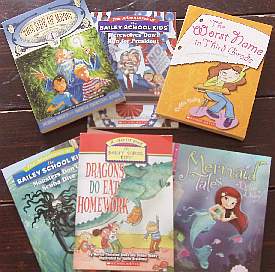Jon's here with some tips on how to view the world in a way that will make you a better and more successful writer.
.
[leadplayer_vid id=”516C6CDF9C036″]
You’ve got a thrilling plot, quirky characters and riveting dialogue. Will anyone care or even notice if your participles dangle or if you’re stumped by which pronoun to use?
Actually, yes.
Editors are looking for reasons to whittle down their slush pile, and if your manuscript shouts “bad grammar” from
Bart Heird via Compfight
Those of us of a certain age cut our reading teeth on Nancy Drew, the Dana Girls, and other books starring teenage heroines. They were great. I wanted to be just like Nancy. I wanted to solve mysteries with her. Mostly, I wanted to look
 From the Harry Potter books to Christopher Paolini’s Eragon novels, fantasy series have long been teen favorites. I asked author Karyn Henley, author of the Angelaeon Circle novels, to give you some tips about writing in this popular genre.
From the Harry Potter books to Christopher Paolini’s Eragon novels, fantasy series have long been teen favorites. I asked author Karyn Henley, author of the Angelaeon Circle novels, to give you some tips about writing in this popular genre.
The Angelaeon novels center on a young priestess who is drawn
One of the most versatile and accomplished writers in children’s literature shares her advice!
Over the years, we’ve given readers, aspiring authors and lovers of children’s literature the opportunity to interact directly with some of their favorite writers. The result: a number of revealing conversations with some remarkable authors. We’re proud to present a few of the best

Debbie Dadey is the author of over 150 children’s books, including The Adventures of the Bailey School Kids series. Debbie was a first grade teacher and librarian before becoming a full-time writer.
Her award-winning “books for reluctant readers” have been published by Scholastic, Tor/Starscape Publishing, Hyperion Press, Bloomsbury USA,
From mysteries to thrillers to historical fiction – learn the rules of the road for developing your plot.
Genre writing requires particular attention to plot, as each genre has its own unique plot structure. When creating your characters and determining your story’s catalyst, keep in mind where the overall
Listen to Deborah Halverson, an award-winning young adult author and former Harcourt editor, talk about her newest book Writing Young Adult Fiction for Dummies. In this podcast, Deborah gives tips for writing teen dialogue and knowing if your book has the all-important “hook” that editors want. Check out
Listen in as Laura chats with multitalented children’s author and photographer Steve Swinburne.
Steve is the author of more than 25 books, including Wiff and Dirty George – The Z.E.B.R.A. Incident (wiffanddirtygeorge.com), Ocean Soup: Tide Pool Poems
(oceansoupbook.com) A Butterfly Trail and Saving
 If you’ve studied fiction writing you know that characters rule. Above all, your protagonist must leap off the page as a living, breathing being. Your antagonist (the force working against your main character) must be similarly real. But if you’re writing an adventure story, or a thriller with a breakneck
If you’ve studied fiction writing you know that characters rule. Above all, your protagonist must leap off the page as a living, breathing being. Your antagonist (the force working against your main character) must be similarly real. But if you’re writing an adventure story, or a thriller with a breakneck
 Laura chats with award-winning author Donna Gephart about writing humorous middle grade fiction, tapping into the concerns of that age group, and reaching her market. Visit www.donnagephart.com to see the trailer for her newest novel, How to Survive Middle School.
Laura chats with award-winning author Donna Gephart about writing humorous middle grade fiction, tapping into the concerns of that age group, and reaching her market. Visit www.donnagephart.com to see the trailer for her newest novel, How to Survive Middle School.
Listen now:
[audio:http://cbiclubhouse.com/wp-content/uploads/2010/07/Interview-Donna-Gephart.mp3]Have you ever gotten to the end of a book and thought “So what?” Did it make you want to read more by that author, or recommend the book to a friend? Satisfying endings go hand in hand with strong beginnings in framing the reader’s experience. No matter how masterfully written the rest of the story, if the ending is a letdown it overshadows everything that came before.
Once you’ve brainstormed on your important characters, your story’s catalyst, and the general arc of the plot, you’re ready to outline.
Create a rough outline of your main storyline. Use any outline format that works for you. (If you’re stuck, here’s a nice guide to help you with
The big screen is filled with great storytelling techniques that you can employ to improve your own writing. Here’s just some of what you can lift from your favorite films….
How do you develop a main character that isn’t exactly human? Laura’s got the answer for you!
[leadplayer_vid id=”532790268EB44″]